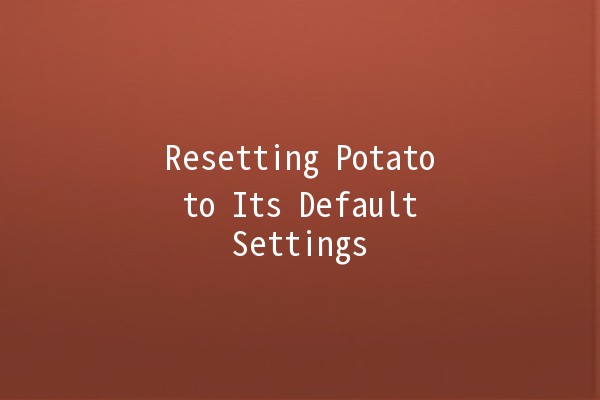In today’s fastpaced digital world, we often immerse ourselves in complex technologies and software environments that can lead to confusion and inefficiency. One such application that has gained popularity for its simplicity and versatility is Potato – a userdriven software that allows for simplified tasks across various platforms. However, you may find yourself needing to reset Potato to its default settings for several reasons: to troubleshoot issues, to start fresh, or to clear personalized configurations. In this comprehensive piece, we’ll explore various productivityenhancing tips while also walking you through the importance and process of resetting Potato.
Understanding the Need for a Reset 🎯
When utilizing software applications like Potato, users often customize settings to fit their unique needs. While customization is valuable, it can lead to unwanted complexity. Here are a few common scenarios where resetting might be required:
Five Productivity Tips to Boost Efficiency with Potato 🚀
While understanding how to reset Potato is crucial, enhancing your productivity while using it is equally important. Here are five tips to maximize your efficiency:

Explanation: Utilizing shortcuts can save time and streamline your workflow.
Example: If you use Potato to manage files, consider setting up keyboard shortcuts to quickly access frequently used directories or tools. For instance, assigning “Ctrl + Shift + D” to open your documents folder can speed up your work considerably.
Explanation: A wellorganized workspace enhances focus and reduces distraction.
Example: Use Potato’s tagging features wisely. Creating clear, descriptive tags for different tasks or projects can help in quickly locating what you need, thereby enhancing your productivity.
Explanation: Automation can reduce the time spent on repetitive tasks, freeing you to work on more meaningful projects.
Example: If Potato has automation features, you can set it up to perform certain tasks at specific times, like running reports or sending reminders by scheduling them to execute without your direct intervention.
Explanation: Backup ensures that your settings and important data are safe from unexpected loss.
Example: Before resetting, always create a backup of your custom settings in Potato. This ensures that you can restore your configuration if needed, thereby saving time in the future.
Explanation: Uptodate software possesses the latest features and bug fixes, enhancing your productivity.
Example: Make it a habit to check for updates for Potato. Many applications notify users when updates are available. A quick check can often mean access to new features that improve efficiency.
How to Reset Potato: StepbyStep Guide 📋
While enhancing your productivity, knowing how to reset Potato to its default settings is equally important. Here’s how to do it safely:
Step 1: Open Potato
Begin by launching the Potato application. Ensure you’ve saved any important data you may need before proceeding with the reset.
Step 2: Navigate to Settings
Locate the settings icon, usually represented by a gear or wrench symbol. Click on it to access the settings menu.
Step 3: d the Reset Option
Within the settings menu, look for an option like "Restore Default Settings" or "Reset Configuration." This may be located under advanced settings.
Step 4: Confirm Your Action
Most applications will require confirmation before proceeding with a reset. A prompt will likely inform you that resetting will erase all current settings. Confirm your decision carefully.
Step 5: Restart Potato
After resetting, restart the application to ensure that the changes take effect.
Step 6: Reconfigure as Needed
Now that Potato has returned to its default settings, you can begin reconfiguring it to suit your needs or exploring it with a fresh perspective.
Frequently Asked Questions (FAQs) 🤔
When you reset Potato to its default settings, your customized configurations will be lost, but your data files should remain intact. It’s crucial to back up any important settings or workflows before performing a reset.
There is no fixed schedule, but it’s advisable to reset the application whenever you experience significant issues or after major updates. If you notice frequent performance drops, a reset might be a good first troubleshooting step.
Yes! Before considering a reset, try troubleshooting steps such as clearing cache, checking for updates, or reviewing the installed plugins. Often these methods will fix bugs without needing a full reset.
If you’ve created a backup of your settings prior to the reset, you can restore them easily. Always ensure to back up configurations before making significant changes to the application.
Resetting can clear bloated configurations and restore performance if previous settings were causing slowdowns. In many cases, users find improved responsiveness after a reset, allowing Potato to function as intended.
Yes! If you encounter issues after resetting Potato, customer support resources such as forums, help sections, or contact options should be available to assist with troubleshooting and any additional questions you might have.
Boosting Your Efficiency with Potato 🌟
Resetting Potato to its default settings not only helps in solving immediate problems but also provides an opportunity to rethink how you use the application effectively. By integrating the above productivity tips into your routine, you can enhance your efficiency and make better use of available resources.
Feel free to explore and experiment with various features within Potato, and remember, resetting isn’t just a way to fix issues; it’s also a way to rediscover and optimize your workflow for brighter, more productive days ahead.